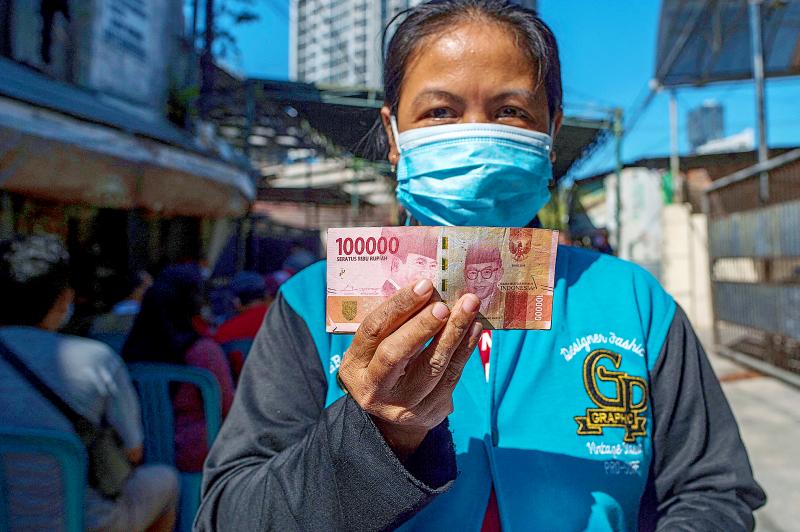The Indonesian rupiah could be Asia’s best-performing currency for the rest of this year, with elevated commodity prices boosting the nation’s trade surpluses.
The exporter of coal and palm oil is benefiting from a global energy crisis that has roiled many of its peers that are net commodity importers.
Indonesia is due to post last month’s trade figures on Friday, following a record US$4.74 billion surplus in August — its 16th in a row.

Photo: AFP
The rupiah rose 1.3 percent in the third quarter, even as Asian rivals weakened with rising US Treasury yields. With the nation’s foreign reserves at a record, Bank Indonesia has plenty of ammunition to support the currency if US yields rise further in coming months.
“We continue to lean positively on the IDR and expect it to remain one of the best performers across EM [emerging markets] Asia on a total-returns basis in Q4,” said Divya Devesh, head of ASEAN and South Asia FX research at Standard Chartered Bank in Singapore.
He said that Indonesia was in a better position than before the 2013 taper tantrum, with a combined current account trade surplus of US$13 billion in the past four quarters, compared with a US$12 billion deficit eight years ago.
There are threats to the rupiah’s bid to remain at, or near the top, of Asia’s leadership board this quarter after topping it in the three months ended last month.
The currency’s inability to breach a technical resistance at 14,200 against the US dollar last month despite all the bullish momentum could limit more gains.
Continued increases in Treasury yields could also weigh on the attractiveness of the rupiah’s trade.
Foreign funds have sold the nation’s debt for 13 consecutive days through Tuesday last week on a net basis.
However, many of the rupiah’s regional rivals are facing even bigger headwinds.
The baht has been dragged down by Thailand’s slowing economy and a growing current account deficit, while the Philippine central bank has signaled that the peso could weaken more this quarter.
Meanwhile, the Singaporean dollar’s upside might be limited if the Monetary Authority of Singapore leaves its policy parameters unchanged at its upcoming policy review, as is widely expected.
The Malaysian currency is the one outlier that could knock the rupiah off its perch. A high vaccination rate enabling authorities to roll back curbs and surging oil prices are buoying Malaysia’s growth.

CAUTIOUS RECOVERY: While the manufacturing sector returned to growth amid the US-China trade truce, firms remain wary as uncertainty clouds the outlook, the CIER said The local manufacturing sector returned to expansion last month, as the official purchasing managers’ index (PMI) rose 2.1 points to 51.0, driven by a temporary easing in US-China trade tensions, the Chung-Hua Institution for Economic Research (CIER, 中華經濟研究院) said yesterday. The PMI gauges the health of the manufacturing industry, with readings above 50 indicating expansion and those below 50 signaling contraction. “Firms are not as pessimistic as they were in April, but they remain far from optimistic,” CIER president Lien Hsien-ming (連賢明) said at a news conference. The full impact of US tariff decisions is unlikely to become clear until later this month

GROWING CONCERN: Some senior Trump administration officials opposed the UAE expansion over fears that another TSMC project could jeopardize its US investment Taiwan Semiconductor Manufacturing Co (TSMC, 台積電) is evaluating building an advanced production facility in the United Arab Emirates (UAE) and has discussed the possibility with officials in US President Donald Trump’s administration, people familiar with the matter said, in a potentially major bet on the Middle East that would only come to fruition with Washington’s approval. The company has had multiple meetings in the past few months with US Special Envoy to the Middle East Steve Witkoff and officials from MGX, an influential investment vehicle overseen by the UAE president’s brother, the people said. The conversations are a continuation of talks that

CHIP DUTIES: TSMC said it voiced its concerns to Washington about tariffs, telling the US commerce department that it wants ‘fair treatment’ to protect its competitiveness Taiwan Semiconductor Manufacturing Co (TSMC, 台積電) yesterday reiterated robust business prospects for this year as strong artificial intelligence (AI) chip demand from Nvidia Corp and other customers would absorb the impacts of US tariffs. “The impact of tariffs would be indirect, as the custom tax is the importers’ responsibility, not the exporters,” TSMC chairman and chief executive officer C.C. Wei (魏哲家) said at the chipmaker’s annual shareholders’ meeting in Hsinchu City. TSMC’s business could be affected if people become reluctant to buy electronics due to inflated prices, Wei said. In addition, the chipmaker has voiced its concern to the US Department of Commerce

STILL LOADED: Last year’s richest person, Quanta Computer Inc chairman Barry Lam, dropped to second place despite an 8 percent increase in his wealth to US$12.6 billion Staff writer, with CNA Daniel Tsai (蔡明忠) and Richard Tsai (蔡明興), the brothers who run Fubon Group (富邦集團), topped the Forbes list of Taiwan’s 50 richest people this year, released on Wednesday in New York. The magazine said that a stronger New Taiwan dollar pushed the combined wealth of Taiwan’s 50 richest people up 13 percent, from US$174 billion to US$197 billion, with 36 of the people on the list seeing their wealth increase. That came as Taiwan’s economy grew 4.6 percent last year, its fastest pace in three years, driven by the strong performance of the semiconductor industry, the magazine said. The Tsai